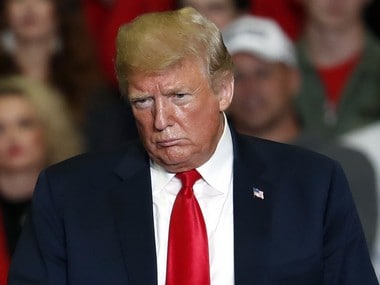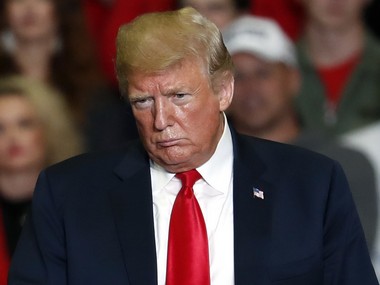Afghanistan is pregnant with developments destined to carry weightier longer-term implications, and most of these implications are in fact perilously damaging for Indian interests. The threat of a Taliban takeover of the whole of Afghanistan following the imminent withdrawal of the United States is high risk. The United States under President Donald Trump has almost lost any appetite to prevent such an occurrence. The Afghan “black hole” seems to have sucked America’s resources as well as its will. The oft-repeated adage that Afghanistan is the nemesis of empires has come to haunt Trump. But Trump’s knowledge of historical facts surrounding the Afghan conflict is as profound as his reading habits. One cannot even laugh at Trump’s argument that the former Soviet Union, which invaded Afghanistan in 1979, felt compelled to be there because “terrorists were going into Russia” at that time. Trump has brutally frittered away the luxury of being reminded by James Mattis that there were no jihadists or terrorists before that date. It was the United States’ strategic response in collaboration and coordination with Pakistan and Saudi Arabia that helped create a huge army of jihadists known as al-Qaeda and its assorted regional allies and offshoots. It is Trump’s unfathomable inability to distinguish facts from fiction which has prompted him to target the Narendra Modi government’s contribution in Afghanistan. Trump’s assessment is dangerously delusional. Trump’s dismissal of India’s soft power as a component of its foreign policy toolbox in Afghanistan is not unusual; it is reflective of his essentially transactional view of India’s relationship with the United States. [caption id=“attachment_5515641” align=“alignleft” width=“380”]  File image of US president Donald Trump. AP[/caption] India has every reason to suffer a sense of outrage at Trump’s competing priorities and perspectives. New Delhi has already been playing a key role in Afghanistan’s stabilisation and reconstruction without putting boots on the ground. India has pledged more than $3 billion in aid and is currently implementing several high-impact development projects across Afghanistan. The Modi government has also reversed the earlier policy of not supplying lethal military equipment to Afghanistan; India has provided gunship helicopters in the last few years. However, it is virtually impossible for New Delhi to agree to send troops to Afghanistan since there is a bilateral consensus on this issue. There is no doubt that India is in for the long haul in Afghanistan. But Trump seems to have pricked some of India’s naive and ideologically-driven bubbles on the Afghan question. Trump’s rumblings provide an opportunity to learn many lessons. First, domestic interests of countries often override the commitments made to friends. Second, India needs to seriously question this wisdom that Washington and New Delhi can be long-term partners in making Afghanistan stable, secure and prosperous. Third, when diplomatic framework on ending the Afghan conflict essentially focuses on negotiations to reshape the landscape of political power in Kabul and find ways to accommodate the Taliban, India’s absence from the scene of action is jarring, to say the least. Fourth, irrespective of India’s unease, the difference between “good Taliban” and “bad Taliban” has made a decisive comeback; when all of India’s major allies and partners – Washington, Moscow and Iran – are talking to the Taliban, can New Delhi afford to stay away? Even the Ashraf Ghani regime is desperate to open a direct channel of communication with the Taliban. But Trump’s delusion that Pakistan can contribute positively is perhaps the most glaring idea. Pakistan has always been the major problem in Afghanistan’s stabilisation; it has become more troubling at a moment when the Taliban are on an ascendant trajectory. America’s withdrawal from Afghanistan may bring about a temporary rapprochement between the United States and Pakistan, but there will be no change in Rawalpindi’s policy matrix. Pakistan’s relationship with its immediate neighbourhood is invariably shaped by the powerful military’s “zero-sum” view of regional geopolitics. Just like his predecessor Barack Obama, Trump has unsuccessfully tried to co-opt Pakistan’s military generals to terminate America’s engagement in Afghanistan. The US special envoy Zalmay Khalilzad is not oblivious to the reality that any enduring peace deal with the Taliban is unlikely as long as Pakistan does not stop playing a double game. But he is seeking to repeat failed efforts, including wooing the Taliban which is sheltered in the safe havens located in Pakistan’s prominent cities. But whatever the outcome of Khalilzad’s efforts to win the support of Rawalpindi for facilitating the US-Taliban talks, Pakistan’s strategic location, sheer demographic size, nuclear weapons and the fact of its being the closest Chinese partner in the region undoubtedly make Pakistan a much higher priority than Afghanistan for the United States. That explains Pakistan’s audacity to demonstrate its indispensability in the Afghan reconciliation process, which has become a bargaining tool in its relationship with the United States. Policies pursued by Trump continue to play havoc with international politics, and India has no option but to factor it into its own geopolitical calculus. One can hardly dispute the fact that only a broad-based regional approach can provide the beginnings of a coherent exit strategy for America – an approach in which competing security concerns of different stakeholders are adequately addressed. Crafting an effective exit strategy also demands an understanding of Pakistan’s strategic vision, and Trump is utterly incapable of this. Trump’s outbursts of anger over the duplicity of Pakistan’s Afghan policy had suggested that Afghanistan could provide a means of solidifying the India-United States partnership. But a closer embrace of the United States does not necessarily mean New Delhi must align its Afghan policy with the priorities of the Trump administration. Trump’s impulses are going to dictate America’s “drawdown” rather than the strategic realities of Afghanistan. Trump may also feel tempted to delegate the responsibility of Afghan security to Pakistan, which would undeniably be the worst possible outcome for India.
It is Trump’s inability to distinguish facts from fiction which has prompted him to target the Narendra Modi government’s contribution in Afghanistan.
Advertisement
End of Article


)

)
)
)
)
)
)
)
)



